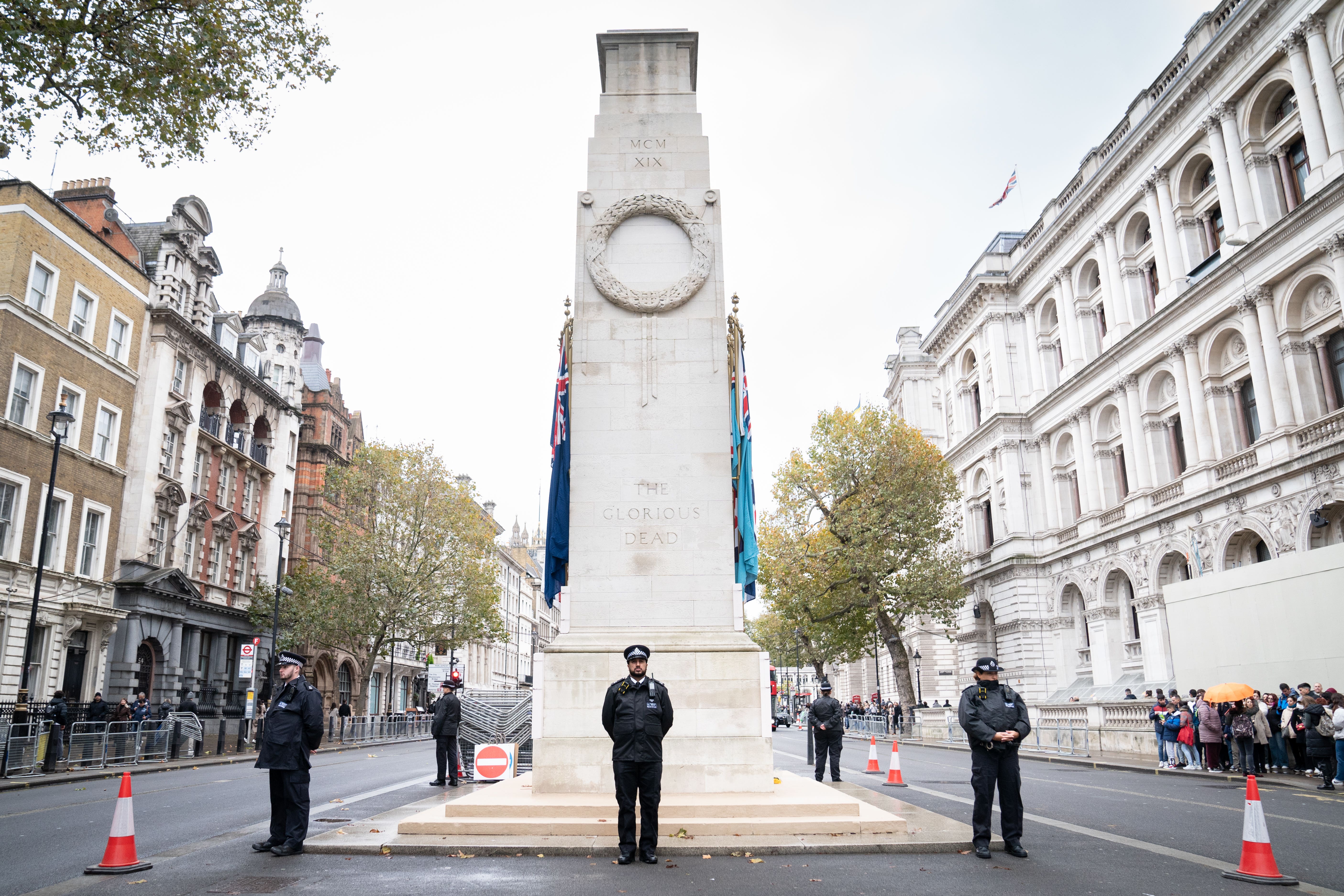So who is hateful now, Suella?
Editorial: Sir Mark Rowley, the Met police commissioner, judged the issue better than the prime minister, and much better than the home secretary

There should be no doubt about what the prime minister needs to do, given that more than 300,000 people marched peacefully to express their support for Palestinian rights, while it was the English nationalists incited by Suella Braverman who disrespected the Cenotaph that she said she cared so much about.
Perhaps now Rishi Sunak will finally get on with it. And sack the home secretary. If she had any humility – a quality in which she is signally lacking – she would apologise for labelling all the pro-Palestinian demonstrators “hateful”. Most of the hate on show today came from right-wing thugs dressed in black or draped in St George flags, chanting “England till I die”, who pushed their way into Whitehall where tomorrow’s Remembrance Sunday service will be held.
Ms Braverman’s incendiary and grossly irresponsible claim on the eve of the march that the police were biased in favour of the left could only have encouraged the thugs to think that she was on their side.
Thus the “disrespect” shown to the commemoration of Armistice Day came from “aggression from counter-protesters” towards police officers in the minutes leading up to the two minutes’ silence, as the Metropolitan Police put it.
At least the silence itself was observed – as the nation paused to remember the sacrifice of those who gave their lives for the sake of our freedoms, as we will pause again tomorrow. But it was marred by what the police called “unacceptable violence” around the area of the Cenotaph later on. More than 90 right-wing protesters were arrested throughout the day, “to prevent a breach of the peace”.
Their behaviour was more “disrespectful” than the prime minister said the pro-Palestinian march would be.
The Independent congratulates Sir Mark Rowley, the Metropolitan Police commissioner, for resisting political pressure to ban the pro-Palestinian march. He ensured that the police did what they should be doing: upholding the right to free expression and the principle of the rule of law.
We have been critical of the leadership of London’s police in the past, but today we say that Sir Mark struck the right balance. He used the powers he has under the law to ban protesters from occupying central London railway stations, and he used his discretion to agree with the march organisers that their route would stay away from the Cenotaph – not that they ever gave any indication that they wanted to go that way.
On this occasion, we say that the police handled a difficult situation with skill and good judgement. We wish that we could say the same about our political leaders. Rishi Sunak did not emerge with much credit from his apparent wish to ban the pro-Palestinian march and his subsequent grudging acceptance – after he met Sir Mark, who patiently explained what the words “operational” and “independence” meant – that it should go ahead.
But at least the prime minister did not try to pour petrol on the embers of identity politics in the way that the home secretary did. Her deliberate use of the term “hate marches”, including in an article for The Times on Thursday which Mr Sunak asked her not to publish, seemed designed to stir up animosities and to encourage hostile groups to confront each other today.
Of course, Tommy Robinson, the former leader of the English Defence League, probably did not turn up in Whitehall today just because Suella Braverman wrote a foolish article. And some of his supporters might have sought to stage a counter-demonstration to the pro-Palestinian march, whatever Ms Braverman said. But her stoking of those tensions when as home secretary she has a special responsibility to defuse them was reason alone for Mr Sunak to dismiss her.
As the Metropolitan Police said: “The counter-protesters are not one cohesive group.” Some of them may have been EDL thugs looking for a fight with either pro-Palestinian marchers or the police. Others may have been sincere in wanting to defend the Cenotaph from imagined threats.
Equally, the pro-Palestinian marchers were not a single cohesive group either. A small minority may have been looking for a fight; a small minority may have sought to support Hamas and to praise its “resistance”, which involved the murder of teenagers at a music festival; but the vast majority wanted to express their urgent desire to end the violence and to respect the rights of Palestinians.
Fortunately, Sir Mark understood the difference between a hate march and a march that attracted some haters from both ends of the political spectrum rather better than the home secretary did.
Let us hope that the prime minister is finally able in the next few days to summon up the courage to restore Ms Braverman to her rightful place on the back benches, and to replace her with someone with a better grasp of the freedoms for which the fallen gave their lives.






Join our commenting forum
Join thought-provoking conversations, follow other Independent readers and see their replies
Comments